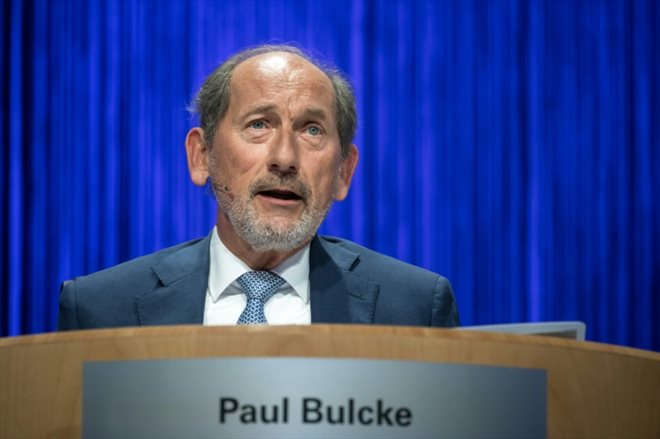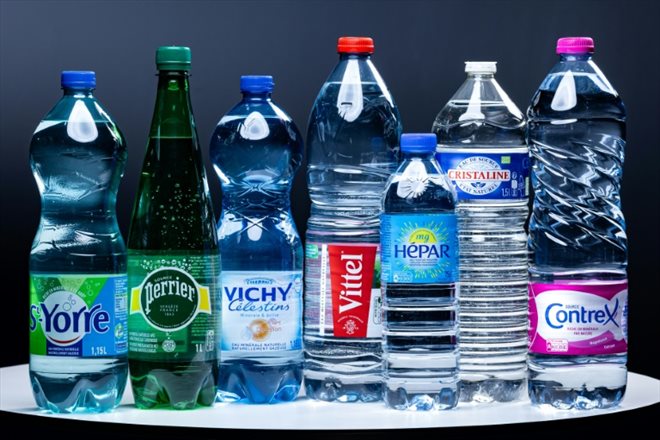Nestlé CEO Ulf Mark Schneider during the general meeting of shareholders of Swiss food giant Nestlé in Ecublens, near Lausanne, on April 18, 2024 (AFP/Fabrice COFFRINI)
Nestlé had to answer for its healthy food strategy at its annual general meeting on Thursday, with shareholders putting pressure on the group to adopt stricter targets.
The bottled water scandal and questions about the sugar content of baby food “damage confidence” and show “the need” for Nestlé to adopt more restrictive targets, said Vincent Kauffmann, the director of the Ethos foundation, during a speech during the general assembly held near Lausanne.

Nestlé CEO Ulf Mark Schneider during the general meeting of shareholders of Swiss food giant Nestlé in Ecublens, near Lausanne, on April 18, 2024 (AFP/Fabrice COFFRINI)
This foundation, which represents pension funds in Switzerland, was one of the organizations which supported a resolution tabled by the British NGO ShareAction to force the Swiss group, owner among others of Nespresso coffee pods, Maggi broths and KitKat chocolate bars, to make more efforts to increase the share of healthy foods in its turnover.
The resolution was also supported by asset management companies Legal and General Investment Management, Candriam and La Francaise Asset Management.
The Swiss shareholder organization Actares also called for a vote in favor.
Shareholders rejected it by 87.88% of the votes, against 11.07% in favor and 1.05% abstentions.
– A strong signal –
“We did not think that the resolution would be adopted,” Thomas Abrams, who represented the NGO at the general assembly, told AFP.
“But we managed to send a very strong signal to show that investors are worried,” he said.

Paul Bulcke, president of Nestlé, during the general meeting of shareholders of the Swiss food giant Nestlé in Ecublens, near Lausanne, April 18, 2024 (AFP/Fabrice COFFRINI)
In September, Nestlé set a goal of increasing the share of the most nutritious foods in its turnover by 50% by 2030.
Infant milk for babies up to 12 months, which are subject to strict regulations, and products for pets, are not included in the calculation.
The food giant is also committed to marketing treats responsibly, including limiting serving sizes for children’s ice creams and treats to 110 kilocalories or less.
But this objective includes products like coffee, “which has no nutritional value”, argued ShareAction when the tabling of the resolution was announced in mid-March.
Nestlé can therefore “simply sell more coffee” to achieve its objective, argued the NGO, which therefore demanded a vote to force the group to be more precise.
Nestlé is the largest agri-food company in the world and has an enormous influence on the diet of billions of people, defended the NGO, stressing that legislation risked tightening in many countries in the face of the growing costs of obesity for health systems.
In the future, “Nestlé, which relies so heavily on less healthy foods, will find itself in a less good position”, argued Mr. Abrams, believing that it was in the interests of shareholders for Nestlé to strengthen the share of sales made with healthier foods.
Paul Bulcke, Nestlé’s chairman, defended the group’s strategy, explaining that the aim was to strengthen healthy products, but that the company differed on the demands of its shareholders on how to achieve this.
“Consumers are increasingly concerned about their health and aware of the benefits of a balanced diet” and “we have the necessary expertise to support them in this process,” he defended.

Mineral waters from different brands belonging to the Nestlé group, February 21, 2024 in Paris (AFP/Archives/JOEL SAGET)
At the start of the year, Nestlé admitted to having used disinfection treatments in France and Switzerland to “guarantee the food safety” of its bottled waters while these treatments are prohibited for mineral waters.
On Wednesday, the NGO Suisse Public for its part questioned Nestlé’s baby products, affirming that products like Cerelac baby cereals contain added sugar in countries like the Philippines, Nigeria or Senegal, while They don’t contain any at all in Germany or the United Kingdom.
© 2024 AFP
Did you like this article ? Share it with your friends using the buttons below.




